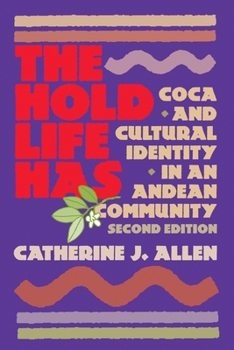The Hold Life Has: Coca and Cultural Identity in an Andean Community
Select Format
Select Condition 
Book Overview
This second edition of Catherine J. Allen's distinctive ethnography of the Quechua-speaking people of the Andes brings their story into the present. She has added an extensive afterword based on her... This description may be from another edition of this product.
Format:Paperback
Language:English
ISBN:1588340325
ISBN13:9781588340320
Release Date:October 2002
Publisher:Smithsonian Books
Length:312 Pages
Weight:0.65 lbs.
Dimensions:0.7" x 6.1" x 9.1"
Customer Reviews
2 ratings
The best available book on Q'ero
Published by Thriftbooks.com User , 19 years ago
This is a wonderful book written by an anthropologist who spent several years in an isolated Andean ayllu (community) located a good number of miles from the provincial center of Colquepata. The attraction of this book is that, unlike most authors responsible for the ever proliferating literature on Andean peoples and their practices, Allen actually lived with the Indians, participated in their ceremonies, potato planting, festivals and travels. The book provides priceless descriptions of the labor divisions between men, women and children and of the interactions between the runa (i.e., Qechua for "people") themselves, between the runa and the city-dwelling mestizos and, perhaps most poignantly, between the people and the land. The land for the Andean peasant is a living breathing organism that needs to be loved, feared and placated with gifts. Each and every horizon marker has a personality, every hill possesses power and there are spirit beings inhabiting different "power spots" from the time immemorial. The interactions between the people, the ancestors, the spirits and the land are part of the reality that needs to be reinforced every single day through little rituals, such as greeting the sun as one steps out of the door early in the morning. Coca represented here part of the glue that held everything together. The rituals that underlie coca chewing bind people in a neverending cycle of mutual obligation; in addition, coca is used as a main ingredient of despachos (ritual offerings) and a source of quiet energy during exhaustive labor on potato fields. Unfortunately, as a result of the demand for processed coca, cocaine, in the US, and the resulting pressure on the Andean countries by coca dealers and foreign goverements alike, the Peruvian peasants have found their access to raw coca leaves (non-addictive) severely limited, which affects a crucial aspect of their culture and cultural identity. Allen depicts all these elements (and much much more) in a simple yet poignant narrative. Everything is exactly where it should be - she brings us close to the individual members of her extended ayllu so that the reader herself can participate. I found the frequent inserts of Quechua phrases especially useful, providing a direct link into the mode of the Andean thought. I highy recommend this book. probably the best one available, if you want to visit Qero regions in peru.
A rather intricate look at rustic Andean life and rituals
Published by Thriftbooks.com User , 25 years ago
Allen's work was rather fascinating. She provided an in depth look at the Runa, a small group of townspeople who adhere to customs of ancient Incan and colonial Spanish civilization. She does an especially good job at exploring the role that Coca chewing plays in their society and in determing their identity. Their rituals and customs will fascinate you. Beware, this book is not for the unsophisticated reader. It's a good read, but requires some thought and exploration to truly appreciate it.





